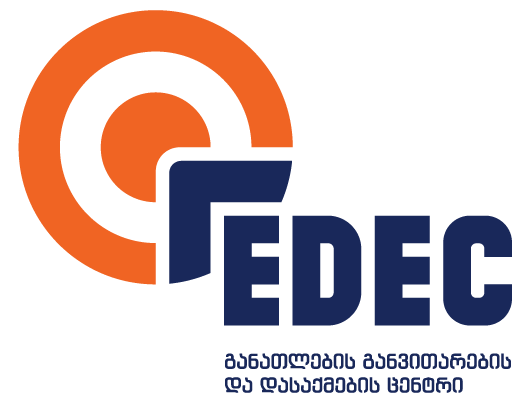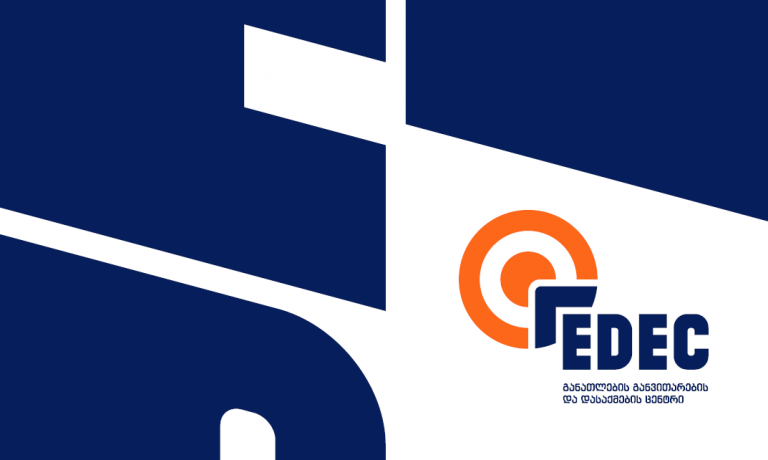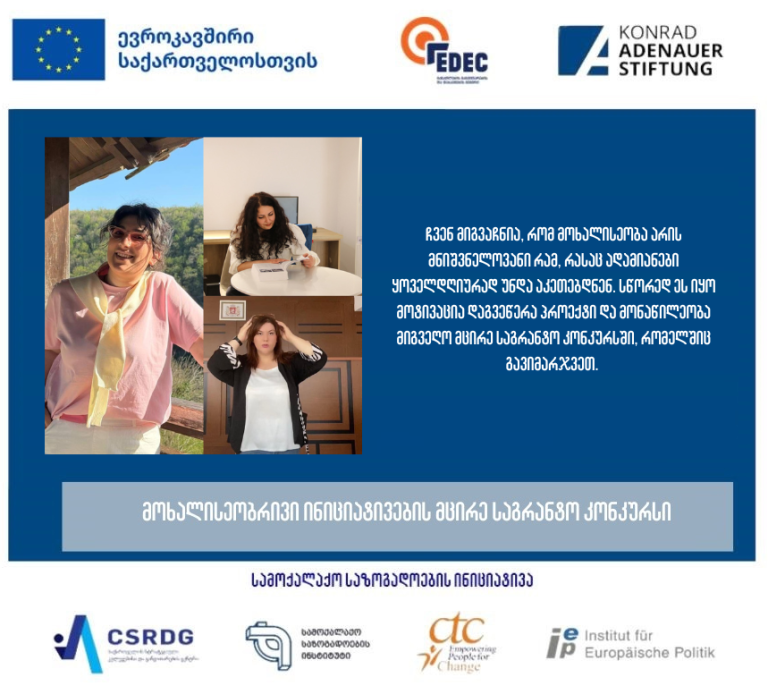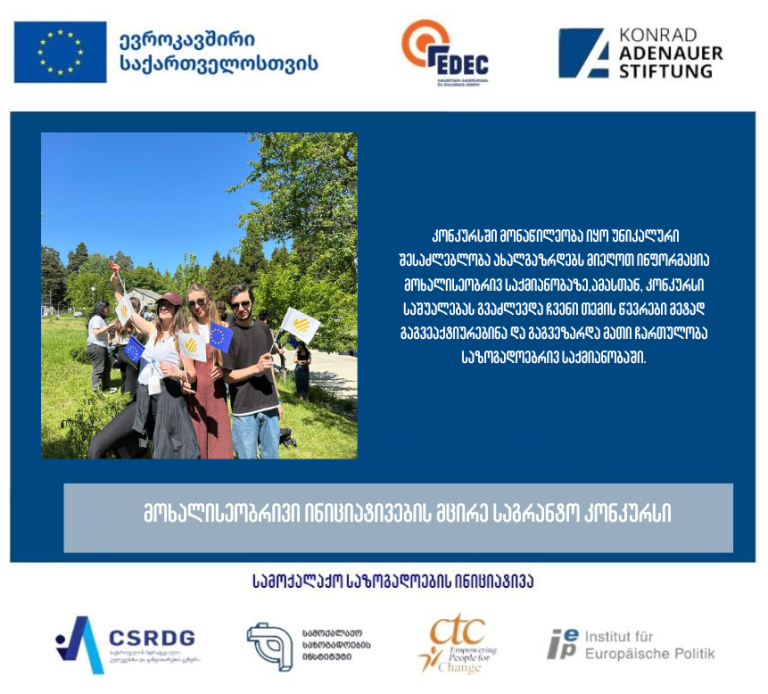Table of contents
- Contracting body. 2
- Project data. 2
- Project summary. 2
- Objectives, expected results and activities of the project 3
- Purpose of the evaluation. 3
- Scope of the evaluation. 4
- Main evaluation questions. 5
- Evaluation approach and methodology. 6
- Deliverables. 6
- Timetable. 7
- Expected qualifications of the evaluator 7
- Deadline for offers. 8
- Coordination/Responsibility. 8
Education Development and Employment Center (EDEC)
#64 P. Ingorokva str. Kutaisi, Georgia, 4600
Type of organization: Non-entrepreneurial Non-commercial Legal Entity
The 36-month project, LEARN for Employment! is based on the collaborative work of three organizations: Education Development and Employment Centre (EDEC), the Employment Agency of the Autonomous Republic of Adjara (EAARA), and Telavi Education Development and Employment Centre (TEDEC). It aligns with Georgia’s VET Reform Strategy 2013-2020 and Labour Market Strategy and Action Plan 2015-2018. The project builds upon previous successful partnerships with state institutions and focuses on the employment of people with disabilities (PwDs) through subsidized workplaces and paid internships.
The overall objective of the action is to promote an efficient transition model from education to the labour market largely supporting increased employment, social integration, and decreased poverty and vulnerability levels. It promotes social dialogue, public-private partnerships, and cooperation between the education and employment sectors. The project intends to improve career guidance and employment services, particularly in underserved regions. It also seeks to align the needs of the labor market with the development of the VET sector, focusing on the maritime and tourism industries. The overall objective is to facilitate a smooth transition from education to the labor market, reducing poverty and vulnerability.
The project aims to enhance career consultation, planning, and employment services in six regions of Georgia. It seeks to develop the infrastructure of the maritime and tourism labor market and improve services aligned with market demands. The project also intends to strengthen the capacity of VET and employment service providers and facilitate the participation of beneficiaries in vocational training, on-the-job training, and internships, with the goal to increase employment opportunities for at least 360 beneficiaries.
The project involves collaboration with the Ministry of IDPs for the Occupied Territories, Labour, Health and Social Affairs (MIDPLSHA), the Ministry of Education, Science, Culture and Sports of Georgia (MoESCS), and the State Employment Service Agency (SESA). Private and state VET providers, business community representatives, professional associations, and social partners will also be engaged. The project aims to benefit Georgian citizens by improving access to lifelong learning opportunities, enhancing employability, and providing career guidance and employment services. The primary beneficiaries are disadvantaged youth, IDPs, PwDs, NEETs, and other vulnerable groups.
The project addresses discrimination by promoting vocational training and employment opportunities for socially vulnerable groups. It advocates for the right to work for all individuals. Efforts will be made to reduce gender inequality and promote vocational education among women and youth, especially in rural and minority communities. The project also aims to engage high mountainous regions with limited access to services and economic opportunities.
| Specific Objective 1 | To contribute to continuous/life-long career guidance and employment service development
|
| Specific Objective 2 | To contribute to increased Public-Private Partnership (PPP) over labour market needs assessment, demand-driven education, work-based learning and apprenticeships in maritime and tourism sectors. |
- Project Outcomes:
| Outcome 1. | The relevant skills matching education and employment services are accessible
|
| Outcome 2. | The capacities of state and private vocational education institutions and intermediary employment service providers are developed.
|
| Outcome 3. | Demand-driven training programmes, LLL schemes, and apprenticeships in the maritime and tourism sectors are available
|
| Outcome 4. | Communication between Public Private Partnership stakeholders is developed and the social dialogue mechanisms at the local as well as national level are established |
- Expected Results/ Outputs:
| Output 1. | In 6 regions of Georgia (Imereti, Guria, Racha-Lechkhumi, Ajara, Shida Kartli, Kakheti) improved continuous career consultation, planning and employment services are available and at least 1260 beneficiaries have the skills and knowledge to apply to jobs in the open labour market
|
| Output 2. | The infrastructure of the maritime and tourism labour market is developed, intermediary services are adjusted to the demands of the maritime and tourism markets |
| Output 3. | At least 8 state and private VET service providers, 6 state and private employment service providers and 90 potential employers improved their capacity in formal, informal and non-formal training and apprenticeship provision
|
| Output 4. | At least 720 beneficiaries participate in VET, on-the-job training and internship programs, and minimum 360 among them are employed |
- Project Activities:
| Activity 1 | Establish Career Guidance and Employment Service Centres (CGESC) providing career consultation, planning and employment support services through offering innovative approaches in digital profiling, learning and skills development |
| Activity 2 | Cooperate with state employment service agencies to support their capacity building and improve the quality of career guidance services |
| Activity 3 | Expand the demand-driven training programs, work-based learning schemes and apprenticeships in the maritime and tourism sectors with active participation of VET providers and potential employers |
| Activity 4 | Train the trainers of VET providers in order to build their training capacity and competencies in the maritime and tourism sectors |
| Activity 5 | Equip colleges with innovative educational materials and learning resources |
| Activity 6 | Create a digital system of maritime and tourism services |
| Activity 7 | Support participation of VET and employment service providers in international VET and business forums in order to foster international partnerships and experience sharing |
| Activity 8 | Equip mentors from employer companies with the knowledge and skills related to on-the-job training and internship service |
| Activity 9 | Practice and promote a dual vocational education in the maritime and tourism sectors through mobilisation of groups of beneficiaries, identifying their VET needs and employment interests as well as engaging them in respective professional education and employment support services |
| Activity 10 | Organize job fairs to increase access to employment in the maritime and tourism sectors |
| Activity 11 | Cooperate with project stakeholders such as central and local government entities to ensure the coherence with relevant state strategies and policies as well as advocate the strengthening of their outreach to the regions and final beneficiaries in a sustainable way |
The purpose of the assignment is to conduct the final evaluation of the project, namely to:
- find out if and/or to which extent the project activities contributed to meeting the specific objectives,
- analyse the achievement of expected results within the planned time period,
- identify the impact of the project on the target groups,
- cover probable challenges/problems in the course of the project implementation and how they had been addressed,
- seek lessons learned,
- generate credible and useful information and recommendations for the Donor(s), partner institution(s) and the implementing organisation that can be incorporated into each organisation’s decision-making process.
The evaluation generally aims at the assessment of the relevance, effectiveness, efficiency, impact and sustainability of the project activities based on the understanding of these concepts according to the DAC Criteria for Evaluating Development Assistance[1]:
- Relevance (OECD/DAC): The extent to which the objectives of a development intervention are consistent with beneficiaries’ requirements, country needs, global priorities and EDEC’s and donor’s policies.
- Effectiveness (OECD/DAC): The extent to which the development intervention’s objectives were achieved, or are expected to be achieved, considering their relative importance. Note: Also used as an aggregate measure of (or judgment about) the merit or worth of an activity, i.e. the extent to which an intervention has attained, or is expected to attain, its major relevant objectives efficiently in a sustainable fashion and with a positive institutional developmental impact.
- Efficiency (OECD/DAC): A measure of how economically resources/ inputs (funds, expertise, time, etc.) are converted to results.
- Impact (OECD/DAC): The positive and negative, primary and secondary long-term effects produced by a development intervention, directly or indirectly, intended or unintended.
- Sustainability (OECD/DAC): The continuation of benefits from a development intervention after major development assistance has been completed. The probability of continued long-term benefits. The resilience to risk of the net benefit flows over time.
The main addressees of this final evaluation are the Donor (European Union) and the programme implementers, EDEC as the lead implementing organisation and its partners.
The scope of this final evaluation shall be the following:
- Time period and/or phases of the intervention to be covered by the evaluation: The entire project shall be evaluated: 09.2021 – 30.06.2023
- Place of evaluation: The evaluation needs to be carried out on-site in the project target area, meaning in Kakheti, Shida Kartli, Imereti, Guria, and Racha-Lechkhumi regions (where the local partners have their offices).
- Timeframe of evaluation: The evaluation shall be carried out from the 1st of July until the 10th of September, including the elaboration and submission of an evaluation report.
- Potential/ expected interview partners:
The evaluator must present the numbers and descriptions of individuals to be interviewed from all target groups and final beneficiaries during the inception workshop. The candidates for interviews must be chosen from::
- 3,867 jobseekers (segregated data of women and men) who gained the skills and knowledge necessary to apply to jobs in the open labour market;
- 832 job seekers who have been employed for a period longer than 3 months;
- 723 beneficiaries engaged in vocational education training (VET);
- 507 beneficiaries involved in an internship and on-the-job training programmes;
- Representatives of local cooperation partners, i.e. Professional education colleges, State Employment Service Agency, Vocational Skills Agency, Institutional and Capacity Development Center, Chamber of Commerce and Industry;
- 1107 Employer companies registered in the database and provided employment or on-the-job training service;
- Experts engaged in labour market needs assessment and development of demand-based professional education courses;
- Representatives of donor organisation (EU-Delegation to Georgia)
The following main questions have to be addressed based on the mentioned evaluation criteria (relevance, efficiency, effectiveness, impact, sustainability) as well as in accordance with other aspects related to the coordination and participation issues. The list below should be considered non-exhaustive and should be supplemented by the evaluator up until the inception workshop.
Relevance
- What is the significance or relevance of the intervention in relation to local and national needs and interventions provided by the project?
- Does the initiative align with regional and national priorities and policies?
- To what extent was the project sensitive and responsive to the specific beneficiary groups and subgroups (e.g., women, disadvantaged individuals) and does it address their needs and interests?
- Are the program’s outputs and activities compatible with its overall goal and the achievement of its objectives?
Effectiveness
How can we interpret the planned activities in comparison to the achieved results?
- Did the project achieve the goals and results outlined in the logical framework (will be provided with the signed Service Contract)?
- To what extent will the objectives of the project be (most likely) met?
- What were the major factors influencing the achievement or non-achievement of the objectives? Which were the success factors? Have there been encountered any problems or unintended results that hindered the implementation of the project?
- Are there any individuals or groups excluded from participation? How was the exclusion of certain individuals or groups addressed?
Efficiency
Are the objectives achieved in a cost-efficient manner by the development intervention?
- Was the input–output relation reasonable and justifiable? Were the activities cost-efficient?
- Were objectives met in a timely manner?
- Was the endeavor coordinated and managed effectively?
- How efficiently were individual resources applied?
- Were there any other ways to achieve the same outcomes with fewer resources?
- Have synergies with other initiatives been sufficiently exploited?
Impact
- How did the project empower state-offered employment services?
- In what ways have the beneficiaries’ lives been significantly altered?
- To what extent have the capacities of beneficiaries been enhanced?
- What benefits did project recipients receive, disaggregated by gender or other relevant social categories, such as minorities?
- Did men and women contribute equally to the intervention’s realisation?
- Do both women and males benefit equally from the intervention?
- Can local and community-level advancements in social justice, livelihood solutions, and others be observed?
- Were beneficiaries’ capabilities enhanced as a consequence of the project?
- Did the undertaking have any unintended (positive or negative) technical, economic, social, cultural, political, or environmental effects?
- Could awareness about the importance of employment intermediary services be raised among local and regional beneficiaries and key stakeholders? Could awareness for social work be increased among the beneficiaries and main stakeholders on a local, regional and national level?
Sustainability
- How is the sustainability or the continuity of the intervention and its effects to be assessed?
- Were the capacities of local stakeholders bolstered?
- How did the project empower state-offered employment services?
- In what ways have the beneficiaries’ lives been significantly altered?
- To what extent have the capacities of beneficiaries been enhanced?
- What benefits did project recipients receive, disaggregated by gender or other relevant social categories, such as minorities?
- Did men and women contribute equally to the intervention’s realisation?
- Do both women and men benefit equally from the intervention?
- Were beneficiaries’ capabilities enhanced as a consequence of the project?
- How many individuals have been impacted by the project?
- Did the undertaking have any unintended (positive or negative) technical, economic, social, cultural, political, or environmental effects?
- Could awareness of employment intermediary services be raised among local, regional, and national beneficiaries and key stakeholders?
The evaluation shall be undertaken by applying a combination of field visits, desk studies, and consultations with the project team. The evaluation method must be participatory, with the active involvement of all key stakeholders.
The process of the evaluation will include:
- consultations with the project team, specifications of the ToR, and desk study;
- conduction of an inception workshop with project staff of each country in order to discuss evaluation methodology and main evaluation questions;
- field visits;
- preparation of draft evaluation report;
- discussion of preliminary evaluation results with the project team;
- preparation of the final report;
- quality control and approval of the final report by the contracting body.
The collection and interpretation of information need to be conducted in a sex-disaggregated manner.
The evaluation process should produce the following reports:
- Inception report in the form of a PPT presentation or Word document including, but not limited to, detailed questions, hypotheses, and indicators to the individual evaluation questions, suggestion of concrete evaluation methods and instruments for the analysis of the evaluation questions, cross-cutting issues, and intervention logic (e.g. desk research, field studies, interviews, etc.); presentation of preliminary results and hypotheses; suggestion on organisational issues (e.g. time schedule and interview and/or visitors’ list) and its presentation in a meeting
- Draft of final evaluation report
- Final report
- The findings shall be summarised in a concise report of 30 to 40 pages, including an executive summary, background information, description of methodology and approach, evaluation findings, conclusions, lessons learned, significant quotes of interview partners, recommendations, and annexes, if necessary. The report should also include a list of all surveyed respondents. The report shall be delivered in English. It is expected that the OECD DAC Evaluation Quality Standards or similar international standards are applied and the compliance of the latter is comprehensible in the evaluation.
The draft and final evaluation report should:
- Fulfil the terms of reference
- Contain a comprehensive and clear summary
- Be structured according to the OECD/DAC or any other recognized evaluation criteria and the evaluation questions
- Indicate cross-cutting issues (e.g. poverty reduction, gender, social justice, and human rights) separately
- Describe and assess the intervention logic (log frame)
- Clearly state the conclusions and recommendations based on the findings
- Clearly differentiate between conclusions, recommendations, and lessons learned
- Show how the evaluator has achieved his/her findings
- Make realistic recommendations and derive lessons learned and indicate to whom the recommendations are addressed
- Document the methods and processes of the evaluation
- Include information from the involvement of / consultations with the most significant stakeholders
- Consider the most important documents
- Present the information contained in a presentable and clearly arranged form, free from spelling mistakes and unclear linguistic formulations
- Be presented in a format that is distributable to the donors and stakeholders involved.
Furthermore, answers to the evaluation questions should be elaborated both individually per region and local partner organisation and by reflecting on the regional perspective of the project and its implications.
| Event | Timeline |
| Deadline for offers (see section 12) | 3rd of July 2023, 18:00 Georgian time |
| Announcement of award of contract | Latest by 10th of July 2023 |
| Workshop for presentation and discussion of inception report in Georgia | Latest by the 21st of July |
| Field visits in the target region | 22nd of August 2023 to 22nd of August 2023 |
| Submission of draft evaluation report | Latest by 4th of September 2023 |
| Submission of a final report | Latest by the 8th of September 2023 |
| Quality control by contracting body and approving of the final report | Latest by 14th of October 2023 |
The evaluator shall fulfill the following qualifications:
- A professional background in social sciences;
- At least 5 years of work experience in evaluating technical cooperation projects, preferably related to social services, education, the justice sector and others;
- A good gender expertise and knowledge of evaluations methods needed for gender-specific analysis;
- An extensive experience in interviewing, data processing;
- Familiarity with the OECD/DAC evaluation quality standards and/or the ones of the Gesellschaft für Evaluation (DeGeval) is absolutely necessary;
- Geographic expertise regarding the regions of Georgia is an asset;
- Previous experience in evaluating regional projects (through own team and/or partnership network)
- Strong communication skills in English and Georgian;
The evaluation shall be carried out within the framework of a Service Contract concluded between the contracting body (EDEC) and the evaluator.
Offers of qualified experts have to be submitted in English latest by 19th of July 2023, 18:00 Georgian time, by e-mail to [email protected] including the following information/documents:
- CV of the expert and any other member of the evaluation team (if necessary)
- Evaluation proposal (description of the suggested methodology, approach, and timeframe including the number of total working days planned and the number and duration of field trips)
- List of evaluation experience including information on the project content, the Donor, the project budget, and the project country
- Expected remuneration (lump sum) in Euro including all taxes (VAT), travel and subsistence costs, and all other expenses (e.g. necessary translation services) connected to the completion of the tasks as described in the above sections. As this lump sum is to cover all expenses arising from the described service no additional costs can be reimbursed next to the submitted offer
- Suggestions and recommendations to the Terms of References, if necessary.
Offers not containing the above-stated documents and information and arriving after the deadline cannot be considered. Only shortlisted candidates will be contacted.
The evaluator will be provided with:
- Project documents (including budget)
- All reports compiled to the project
- List of contacts containing all persons involved in the implementation of the project (with function, task, contact data, and information on language skills) as well as all local partners (including representatives of the target group, as far as feasible). The main contact persons for the evaluator will be the EDEC Project Manager; to clarify operational questions in the region, at the regional level the main contact persons will be the Local Project Coordinators of TEDEC, AIC, EAARA, ICI.
[1] OECD/DAC (2002): Glossary of Key terms in Evaluation and Results Based Management; Development Assistance Committee Working Party on Aid Evaluation: Paris, retrievable under http://www.oecd.org/dataoecd/29/21/2754804.pdf




